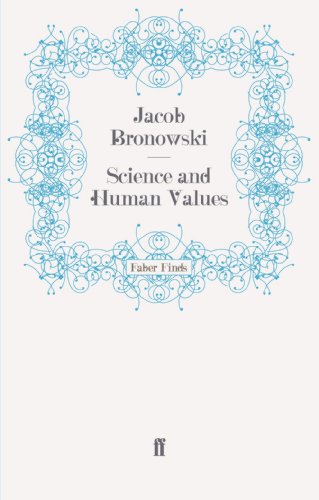Scientists Create and Thrive in a Stable Civilization
I take a different view of science as a method; to me, it enters the human spirit more directly. Therefore I have studied quite another achievement: that of making a human society work. As a set of discoveries and devices, science has mastered nature; but it has been able to do so only because its values, which derive from its method, have formed those who practice it into a living, stable and incorruptible society. Here is a community where everyone has been free to enter, to speak his mind, to be heard and contradicted; and it has outlasted the empires of Louis XIV and the Kaiser. Napoleon was angry when the Institute he had founded awarded his first scientific prize to Humphry Davy, for this was in 1807, vhen France was at war with England. Science survived then and since because it is less brittle than the rage of tyrants.
This is a stability which no dogmatic society can have. There is today almost no scientific theory which was held when, say, the Industrial Revolution began about 1760. Most often today's theories flatly contradict those of 1760; many contradict those of 1900. In cosmology, in quantum mechanics, in genetics, in the social sciences, wWho now holds the beliefs that seemed firm sixty years ago? Yet the society of scientists has survived these changes without a revolution, and honors the men whose beliefs it no longer shares. No one has recanted abjectly at a trial before his colleagues. The whole structure of science has been changed, and no one has been either disgraced or deposed. Through all the changes of science, the society of scientiitists is flexible and single-minded together, and evolves and rights itself. In the language of science, it is a stable society.
Notes:
There's a question of cause and effect in considering Bronowski's observation.
Folksonomies: science culture science virtue
Taxonomies:
/science (0.522034)
/society (0.476360)
/society/crime/personal offense/homicide (0.169933)
Keywords:
human society work (0.912418 (neutral:0.000000)), Stable Civilization (0.719407 (positive:0.677429)), Humphry Davy (0.689653 (positive:0.220751)), different view (0.672608 (positive:0.321358)), science (0.669952 (negative:-0.337810)), human spirit (0.656606 (positive:0.266956)), Louis XIV (0.653119 (neutral:0.000000)), dogmatic society (0.649265 (positive:0.231380)), stable society (0.633347 (positive:0.623603)), incorruptible society (0.632370 (positive:0.587801)), scientific prize (0.616679 (positive:0.220751)), social sciences (0.610865 (neutral:0.000000)), quantum mechanics (0.609094 (neutral:0.000000)), scientific theory (0.607228 (neutral:0.000000)), Industrial Revolution (0.606238 (neutral:0.000000)), method (0.429394 (positive:0.321358)), scientists (0.423988 (positive:0.677429)), Bronowski (0.411361 (positive:0.677429)), changes (0.400618 (positive:0.389139)), beliefs (0.400333 (positive:0.297679)), tyrants (0.393037 (negative:-0.713719)), evolves (0.383358 (positive:0.385879)), observation (0.373113 (positive:0.677429)), Kaiser (0.371451 (neutral:0.000000)), empires (0.370941 (neutral:0.000000)), Napoleon (0.369415 (positive:0.220751)), achievement (0.368797 (neutral:0.000000)), colleagues (0.367825 (negative:-0.734443)), rage (0.366710 (negative:-0.713719)), discoveries (0.365827 (positive:0.607142))
Entities:
Bronowski:Person (0.915202 (positive:0.677429)), Humphry Davy:Person (0.686439 (positive:0.220751)), Napoleon:Person (0.668489 (positive:0.220751)), Louis XIV:Person (0.661670 (neutral:0.000000)), wWho:Company (0.608398 (positive:0.297679)), France:Country (0.477652 (neutral:0.000000)), England:Country (0.468800 (neutral:0.000000)), sixty years:Quantity (0.468800 (neutral:0.000000))
Concepts:
Science (0.949219): dbpedia | freebase | opencyc
Scientific method (0.770798): dbpedia | freebase
Religion (0.614654): dbpedia | freebase | opencyc
Sociology (0.572204): dbpedia | freebase | opencyc
Theory (0.570895): dbpedia | freebase
Society (0.552124): dbpedia | freebase | opencyc
Physics (0.485510): dbpedia | freebase | opencyc
Social sciences (0.480490): dbpedia | opencyc






